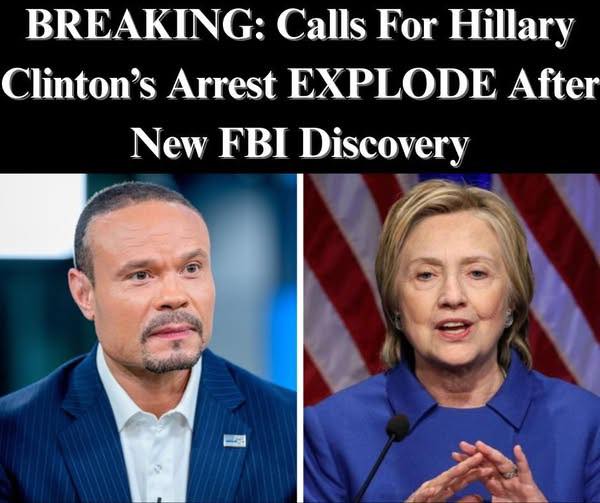New FBI Revelations Spark National Debate Over Clinton, Comey, and Concealed Investigations
New developments have reignited intense public scrutiny over the integrity and transparency of America’s top law enforcement agency. Recent statements from current and former FBI leadership are shining a harsh light on controversial investigations from the past decade—particularly those involving Hillary Clinton’s emails and the Russia-Trump probe—and raising deeper questions about institutional accountability.
This week, FBI Director Kash Patel and Deputy Director Dan Bongino went on record to expose what they describe as “deep-rooted failures” and deliberate obfuscation by prior leadership. Their disclosures, shared during a Fox News interview, paint a picture of a Bureau once heralded for justice that, in their view, strayed dangerously off course.
Clinton Email Scandal Revisited
Among the chief concerns is the FBI’s handling of Hillary Clinton’s use of a private email server during her tenure as Secretary of State. Though the Bureau determined that classified information had indeed been transmitted through Clinton’s personal account, then-director James Comey stunned the nation in July 2016 by declaring the case unworthy of prosecution. His statement—delivered in a high-profile press conference—called Clinton’s conduct “extremely careless” but insisted “no reasonable prosecutor” would pursue charges.
Current Director Patel criticized the move as a serious breach of procedure. “It wasn’t Comey’s decision to make,” he said. “He overstepped his legal role and made a call that belonged to the Department of Justice.”
Election-Eve Twist and Suppressed Records
The controversy deepened when, just 10 days before the 2016 election, Comey reopened the Clinton probe after new emails surfaced in a separate investigation involving former Congressman Anthony Weiner. The timing triggered a political firestorm and, some argue, significantly impacted the election’s outcome.
Patel now claims there was far more to the case than the public ever saw. “Key findings were never properly documented or entered into FBI systems,” he revealed, hinting at internal suppression of crucial evidence.
The Russia Probe and a “Fabricated Narrative”
The Russia investigation that followed Trump’s 2016 victory became a years-long saga. Though Special Counsel Robert Mueller found no grounds for criminal conspiracy between Trump’s team and Russian operatives, he did cite procedural failures in the FBI’s approach.
Now, Patel and Bongino argue that these weren’t just missteps—they were calculated distortions. Patel claims FISA surveillance warrants against Trump campaign adviser Carter Page were based on the now-discredited Steele dossier and pushed forward despite doubts about its credibility.
“This wasn’t just bureaucratic sloppiness,” Patel said. “It was a deliberate attempt to manipulate legal processes for political ends.”
Secret Documents and a Hidden Archive
Perhaps the most explosive claim comes from Bongino, who revealed that an internal audit led to the discovery of a hidden room inside FBI headquarters containing Comey-era files that were never logged into the agency’s database. “These weren’t old storage bins,” he said. “These were active records—memos, emails, internal communications—that had been kept from current leadership and the public.”
While the full contents remain classified for now, Bongino stated that a review is underway to determine what can be declassified and shared with the American people.
Comey’s Cryptic Social Media Post Raises Eyebrows
Meanwhile, former Director James Comey, dismissed by President Trump in 2017, continues to defend his legacy. But a recent Instagram post added a strange twist: a photo of seashells arranged to spell “8647.” Critics interpreted this as a coded message—“86” being slang for eliminate, and “47” possibly alluding to Trump’s bid to become the 47th president.
Bongino called the post “deeply irresponsible,” saying, “This man once led the FBI, and now he’s playing games on social media instead of answering tough questions.”
Rebuilding the Bureau’s Credibility
Director Patel emphasized that the goal now isn’t revenge—but restoration. “This is about bringing truth to light,” he said. “The FBI must never operate above the Constitution. We serve the American people, not political interests.”
He confirmed that a comprehensive audit is underway, focusing on all major investigations from the last 20 years, particularly those where protocol may have been bypassed or evidence concealed.
A Pivotal Moment for American Democracy
As these revelations unfold, the stakes go far beyond party lines. The integrity of the FBI and the credibility of its investigations are foundational to public trust. For many Americans, the central question is not just what happened—but whether the system is willing to hold itself accountable.
Patel put it plainly: “The only way forward is through transparency. We have to face the hard truths if we want to repair what’s broken.”
While investigations continue and the public awaits further disclosures, one thing is clear—this reckoning could redefine the future of federal law enforcement in America.
